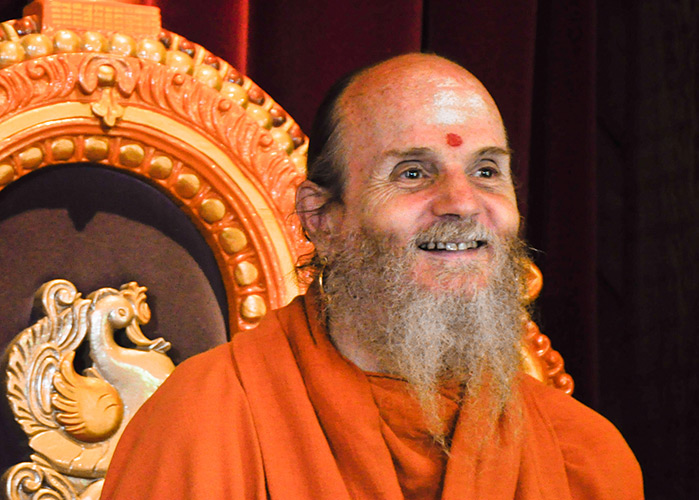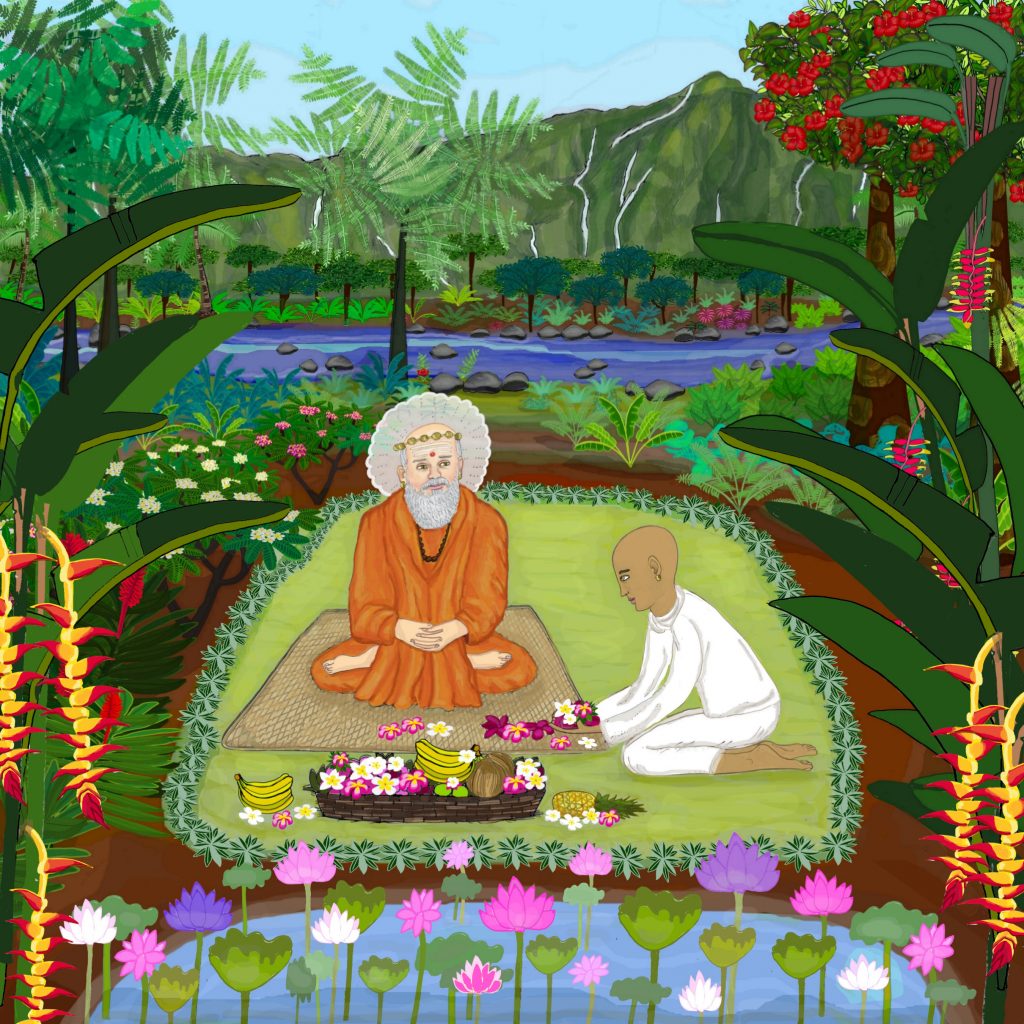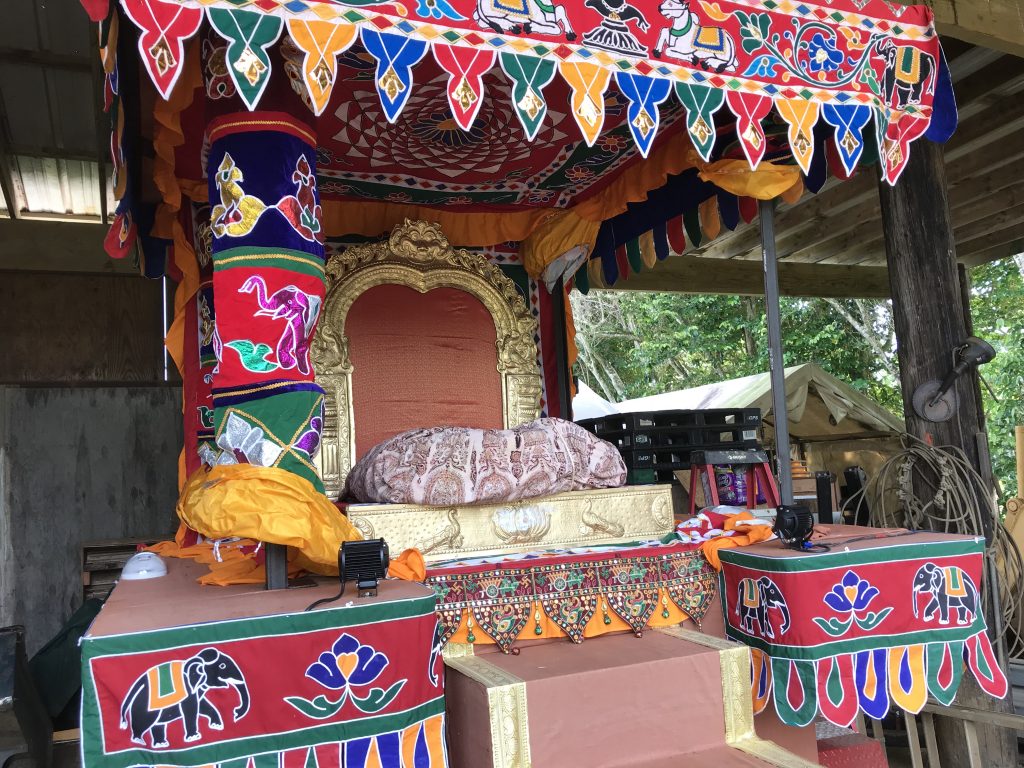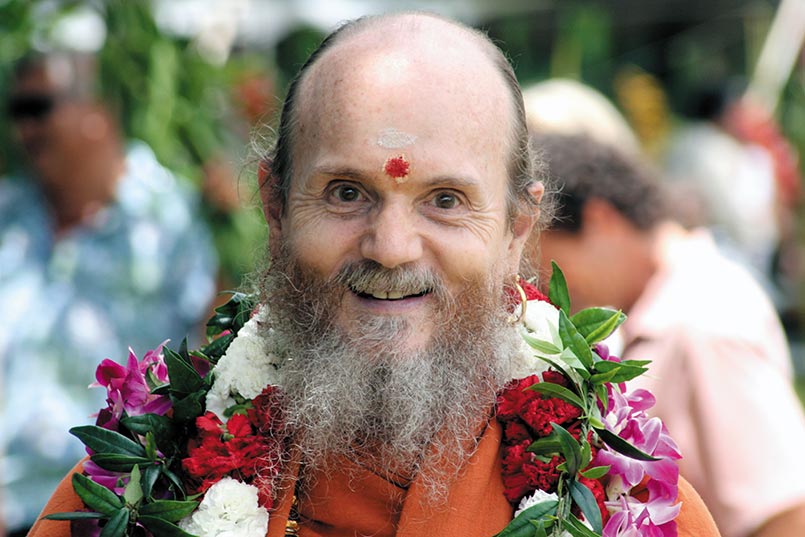Satguru’s Travels
After a short time in Boise, Idaho, Satguru Bodhinatha Veylanswami and Sannyasin Shanmuganathaswami flew to Montreal, Canada. While there they spent time with devotees and explored the area on their morning walks.
Satguru Is Up Up and Away
 Bodhinatha and Shanmuganathaswami made their way to Denver for a layover before going to Boise, Idaho. After a few days there, the two will travel to Montreal, Vermont, Chicago, Kansas and back to Kauai.
You can see all of Satguru's travels, and even join in on their mission, at our travel page
Bodhinatha and Shanmuganathaswami made their way to Denver for a layover before going to Boise, Idaho. After a few days there, the two will travel to Montreal, Vermont, Chicago, Kansas and back to Kauai.
You can see all of Satguru's travels, and even join in on their mission, at our travel page
Why Are We Vegetarian? What About the Environment?

Bodhinatha's Latest Upadeshas
Path to Siva Commentaries
Why Are We Vegetarian?
Vegetarianism: Man's natural and noble diet with a minimum of hurt to other beings. The object of nutrition for meditation and for help on the spiritual path is to practice mitahara--eating a moderate quantity of quality clean fresh vegetarian food. Four types of food: fresh, dead, clean and dirty. "Siva's devotees know that a good diet is the best medicine. They drink two liters of water daily, minimize fried foods and avoid junk foods, white rice, white flour, processed sugar and degraded oils."
How Do We Treat the Environment?
"The Divine is present everywhere and in all things.
All Hindus feel they are guests on the planet with responsibilities to nature." Hindu prayers don't stop with people. Caring for the elements is found right in our various prayers going back all the way to the Vedas. We all can do something to help the environment. For it to be a huge impact the whole society has to move in the same direction."
Click here to go to an index of all of Bodhinatha's and Gurudeva's online audio.
This entry was posted on Wednesday, August 8, 2018 at 8:51 pm and is filed under Bodhinatha, Theology. You can follow any responses to this entry through the RSS 2.0 feed. You can leave a response, or trackback from your own site.
Thank You to a Young Artist
 The Ganapati Kulam recently acquired art of Satguru Bodhinatha and wanted to share the gift with you all. Mahalo to a young artist in California.
The Ganapati Kulam recently acquired art of Satguru Bodhinatha and wanted to share the gift with you all. Mahalo to a young artist in California.
How Do We Treat the Environment?
Satguru Bodhinatha Veylanswami reads from Lesson 50 of the Himalayan Academy publication “Path To Siva,” discussing how Hinduism relates to the environment.
Postulant Vow Renewals

In our monastic order, a monk can only take lifetime vows once they become a sannyasin. Until then they are under short term vows that must be renewed every two years on the auspicious occasion of Guru Purnima. Today our postulants all gathered in the Guru Temple to renew their four vows of humility, purity, obedience and confidence. Below our the introductions to each vow.
HUMILITY IS THE STATE OF profound maturity in which the soul, immersed in the depths of understanding and compassion, radiates the qualities of mildness, modesty, reverent obeisance and unpretentiousness. There is an analogy in the Saivite tradition that compares the unfolding soul to wheat. When young and growing, the stalks of wheat stand tall and proud, but when mature their heads bend low under the weight of the grains they yield. Similarly, man is self-assertive, arrogant and vain only in the early stages of his spiritual growth. As he matures and yields the harvest of divine knowledge, he too bends his head. In the Tamil language this absence of pride or self-assertion is known as pannivu. Pannivu also means "jewel." In the Tirukural it is said that "Humility and pleasant words are the jewels that adorn a man; there are none other."
PURITY IS THE PRISTINE and natural state of the soul. It is not something which the monastic attains as much as that which he already is, and which becomes evident as the layers of adulterating experience and beclouding conceptions are dissipated. Purity is clarity and clearness in all dimensions of being. It is innocence as opposed to familiarity with the ways of the world. It is for monastics the observance of chastity, called brahmacharya. In Tamil purity is given its fullest expression in the term tirikarannasutti, which means "purity in mind, speech and body." These three--also called thought, word and deed--convey the fullness of the ideal of purity.
OBEDIENCE IS THE STATE OF willingness and cooperation in which the soul remains open and amenable to enlightened direction. For the monastic it is an unbroken pledge of trust in and surrender to the satguru, the guru parampara and the mystic process of spiritual evolution. In the Tamil language this definition of obedience is expressed in the term taalvu enum tanmai, which denotes "the quality or state of humble submission." Obedience does not consist in blind submission and yielding to authority, nor in weakening our own will that it may be dominated by the will of another. Yet it is, in another sense, submission to a sacred purpose and the divine authority of the Second and Third Worlds. It is, for the monastic, an inner quality that allows him to remain consciously tractable and responsive.
CONFIDENCE IS THE STATE of trust in which the sacred teachings and sensitive or personal matters are not divulged to others. Spiritual matters must be protected and preserved by those to whom they are entrusted, never wantonly or indiscriminately revealed. When we confide in another, we do so with the assurance that sensitive and serious information will not be inappropriately disclosed. In the Tamil language confidence is known as rahasiyam, meaning "secret or mystery." Confidence as applied to these Sacred Vows does not mean "certainty," "a belief in one's abilities" or "self-confidence." Rather it is a confiding, a trusting and a relying upon. It is the controlled sharing of privileged teachings or information that should not be disclosed, but held in confidentiality. In its most simple form it is the keeping of a secret. Confidence for the monastic may be defined as wisdom in handling information.
Guru Purnima 2018

Early this morning the aadheenam celebrated Guru Purnima with an early morning parade and puja honoring Satguru Bodhinatha Veylanswami. Following the chariot parade down San Marga, our monks and devotees sat down for a pada puja as Satguru entered deep meditation. After the puja, satguru gave blessings to all present.
Kularnava Tantra:
GURU devotion
Lord Siva: "There is One Real. Call it Siva. This Parabrahman is formless, stainless, one without a second, changeless, beyond the highest. This Mahesvara is all-knowing, all-doing, sovereign of all, self-luminous, without beginning or end. All embodied souls, jivas, all the born creatures, are portions of Me, like sparks of the fire. But human birth is the most important, for it is then that one becomes awake, aware of his state of bondage and the necessity of release. It is then that one is in a position to take steps for his liberation from bondage's hold.
"Humans have a self-will and are not totally subject to the impulses and drives of nature as are other creatures. It is only on this earth--and that too in a human body endowed with a soul--that one can choose one's path for spiritual progress. But not all are aware of the precious opportunity afforded by human birth, which is truly the ladder to Liberation. The Self is to be realized only here in this life. If here you do not find it and work out the means for your Liberation, where else is it possible? It is possible nowhere else. It has to be worked out by yourself from within yourself.
"The world you reach after the physical body is shed is determined by the level of consciousness reached while in the body. So, as long as the body lasts, exert yourself towards the goal of Liberation.
"Remember, the physical body does not last forever. Age prowls like a leopard; diseases attack like an enemy. Death waits not to see what is done or not done. Before the limbs lose their vitality, before adversities crowd in upon you, take to the auspicious path.
Therefore, choose, then worship a Satguru. Worship his feet. Cherish the very sandals (paduka) which hold his feet. All knowledge is founded on those paduka. Remember and cherish those paduka, which yield infinitely more merit than any number of observances, gifts, sacrifices, pilgrimages, mantra-japa and rituals of worship."
Purnima Preparations
 All of the monks are busy setting up for tomorrow's grand Purnima abhishekam...more to come tomorrow.
All of the monks are busy setting up for tomorrow's grand Purnima abhishekam...more to come tomorrow.
Why Do We Practice Ahimsa? Bodhinatha Commentary on Path to Siva

Bodhinatha's Latest Upadeshas
Path to Siva Commentaries
Why Do We Practice Ahimsa?
"Ahimsa is called the mahavrata, the great vow." Not harming others, is three-fold: thought, word and deed. Because you see God in everyone you would not want to hurt anyone. And there is the law of karma: Everything that happens to us, positive or negative, we attract due to past action. Use proper channels when harmed; never retaliate. Patanjali Yoga Sutras, Tirukural, Gurudeva's teachings all give examples of how to avoid harming others. T-H-I-N-K.
Path to Siva, Lesson 48.
Click here to go to an index of all of Bodhinatha's and Gurudeva's online audio.
Why Are We Vegetarians?
Satguru Bodhinatha Veylanswami reads from Lesson 49 of the Himalayan Academy publication “Path To Siva,” discussing reasons why our Saivite Hindu tradition observes vegetarianism.
From Our Gurus' Teachings
Archives are now available through 2001. Light colored days have no posts. 1998-2001 coming later.
